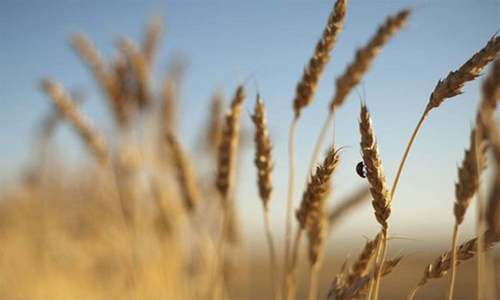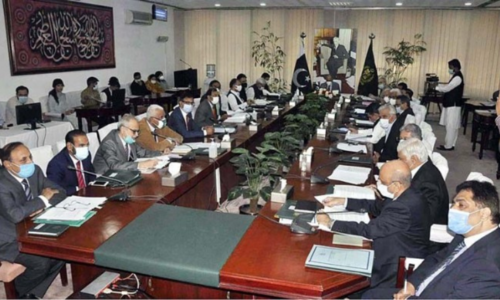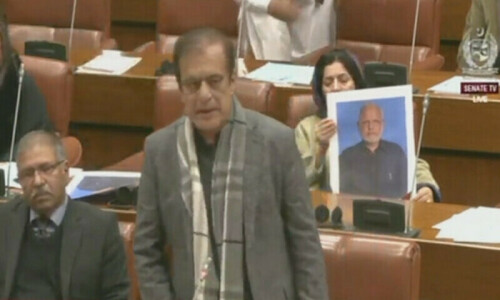ISLAMABAD: With the International Monetary Fund (IMF) programme in limbo, a whopping Rs400 billion energy support package for small and medium industries involving cheaper tariffs over a period of three years could not get through the Economic Coordination Committee (ECC) of the Cabinet on Monday. The ECC cleared Rs1,600 per 40 kg minimum support price (MSP) for coming wheat crop.
The meeting presided over by Adviser to the Prime Minister on Finance Dr Abdul Hafeez Shaikh had been particularly called on Monday instead of usual schedule of Wednesday so that the MSP of wheat and energy support package could be taken to the federal cabinet meeting on Tuesday for instant approval and implementation.
The meeting also allowed import of about 320,000 tonnes of wheat from Russia at the highest rate of all imports this year, approved discounted gas tariff for two fertiliser plants and ordered immediate disbursement of half of power sector subsidy allocated for full year.
An official statement said: “ECC granted approval for the sale of surplus power available at the incremental rate of Rs12.96 per kwh (unit) to all industrial consumer categories, excluding zero-rated industrial consumers, on the incremental consumption over their respective historical consumption or established benchmark.”
No decision on three-year Rs400bn cheaper power tariff for industry
A cabinet member, however, told Dawn that no decision could be reached and would perhaps need to be cross checked and then taken up with the IMF, followed by cabinet approval before its launch. This was also confirmed by at least two more participants of the meeting.
Informed sources said the Power Division had proposed two options to the ECC including Rs12.96 per unit rate for every kind of industrial consumption in B-1 to B-4 categories mostly covering Small and Medium Enterprises (SMEs). This is subsidy neutral option because this is the marginal cost of power generation.
The second option was to provide a subsidised rate of Rs8 per unit involving Rs5 per unit subsidy to encourage SMEs towards maximum consumption as a stimulus as a multiplier effect for enhanced industrial output. Based on past experience, there was an estimate for Rs20bn annual subsidy for SME sector. The existing normal rate for these four categories falling between B-1 to B-4 ranged Rs17.35 and Rs20.40 per unit.
It was noted that subsidy for power sector was budgeted at about Rs140bn and could not be enhance given the limitations of the IMF programme. Hence the idea of utilising Covid-19 related funds carried forward from last fiscal year which also required prior consultations with the IMF.
The package entered choppy waters when estimates of the Central Power Purchasing Agency showed the total cost of the three-year package at $2.5bn or around Rs400bn after also eliminating the concept of peak and off-peak rates. The model showed 40 per cent incremental electricity consumption in first year of package, followed by 100pc further increase in second year and 200pc in third year.
This did not convince mainly technocratic members of the ECC who wanted more in-depth examination of facts and cross-checking of industrial and economic growth numbers to be trusted upon. At least two technocrats questioned believed the total cost of the package could be no more than about $1bn or around Rs160bn in three years.
The question was then to convince the IMF for a different approach towards reviving its programme under peculiar circumstances across the globe following the Covid-19 pandemic, particularly when comparative energy rates in Bangladesh and India were almost 25pc cheaper. The fund programme is practically stalled since February mainly because of freeze on energy rates. The IMF authorities would also need to be explained that these subsidised rates would not be flowing to ‘big seths’ but a large number of SMEs with higher potential for job creation and industrial production.
An official statement said the ECC also formed a committee comprising Adviser to the PM on Institutional Reforms & Austerity Dr Ishrat Hussain, Special Assistant to the PM (SAPM) on Revenue Dr Waqar Masood, Federal Minister for Industries & Production Hammad Azhar, Federal Minister for Power Omer Ayub and SAPMs Nadeem Babar and Tabish Gohar to prepare a proposal to include K-Electric in the package.
“The committee will also propose whether the package shall continue for one year or three years. The committee will also analyse the need for any subsidy that will be involved in the package and source for arranging the same and all the issues that may come up in the calculation and distribution of that subsidy,” the statement added.
The ECC decided to propose to the cabinet Rs1,600 as MSP for wheat crop 2020-21. The ECC was told that the support price mechanism played a pivotal role in boosting wheat production as it stabilised market and increased profitability of the farmers. The new price which has been recommended to Cabinet for approval is close to the price recommended at Rs1,650 by Punjab, which is the largest producer of wheat in the country.
The meeting approved 320,000 tonnes of wheat import on government-to-government (G2G) basis from the Russia by Pakistan Agricultural Storage & Services Corporation (Passco) at the rate of $282.5 per tonne. The ECC also endorsed the request of Ministry of National Food Security and Research (MNFSR) to import another 320,000 from Russia under the G2G arrangement at the new rate of $292 per tonne. This showed the wheat import price has been on a steady increase starting from $234 per tonne about two months ago, with little hopes of reduction in flour price in the market anytime soon.
The ECC also constituted a committee comprising secretaries of Finance, Commerce and Food Ministry to look into the possibility of import of wheat either by Passco or the Trading Corporation Pakistan (TCP). The committee also decided that further tendering of wheat may be stopped and TCP may resort to G2G arrangement for additional procurement of wheat. Keeping in view the arrival of the new crop in March 2021, the forum decided that no vessel of imported wheat should be arranged either in public or private sector beyond February 2021.
The ECC was informed by TCP that till January 2021 the corporation would be able to secure one million tonnes of wheat through international bidding. On the request of MNFSR, the ECC decided that the initial allocation of TCP for the import of 1.5 million tonnes be enhanced to 1.8 million tonnes to cater for the additional requirement of 0.30m tonnes demanded by Khyber Pakhtunkhwa and Sindh for shipment by mid-February.
The ECC also decided to release about 50pc of the tariff differential subsidy to the Power Division. The Finance Division has earmarked Rs140bn for 2020-21 as Power Division subsidy. The release of Rs65.8bn demanded by the Power Division will be used for payments to the power producers in order to maintain adequate liquidity.
On the summary for the determination of gas rate for operations of Fatima Fertilizer and Agritech, ECC decided that gas rate of Rs772 per mmBtu with variable contribution margin at the rate of Rs186 per bag be offered to both the units for the period from Nov 3, 2020 onwards. The government of Pakistan’s share at this gas rate has been estimated on the basis of re-gasified liquefied natural gas (RLNG) last notified rate for July, at about Rs420 million. Further, actual payment by the government for price differential sum to SNGPL may vary due to difference in monthly rate of RLNG.
Published in Dawn, October 27th, 2020

















































